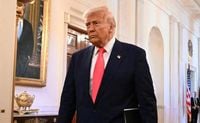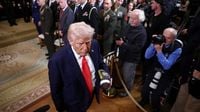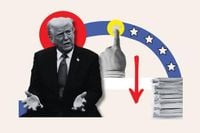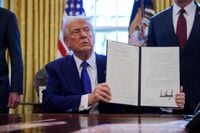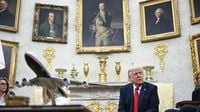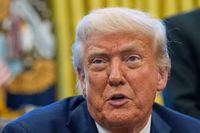As President Donald Trump settles into his second term, his approval ratings reveal a deeply divided nation grappling with his controversial policies, particularly a sweeping tariff announcement that has sparked economic turmoil. Recent polling data indicates that Trump’s approval rating stands at 45%, according to Gallup, marking the lowest approval for any president since World War II, with the exception of his own first quarter in office when he recorded a 41% approval rating.
The average approval rating for U.S. presidents during their first quarter, spanning from 1952 to 2020, is 60%, with notable figures like John F. Kennedy and Dwight Eisenhower achieving ratings above 70%. In stark contrast, Trump is the only president to have averaged below 50% approval in his first quarter, a trend he has repeated in both his terms.
Trump's approval is starkly divided along party lines. A staggering 90% of Republicans express approval of his performance, while only 4% of Democrats share that sentiment. Among independent voters, his approval rating is at 37%, which is nine percentage points lower than during his inauguration. The latest survey, conducted during a period of economic uncertainty following Trump’s April 2 announcement of high tariffs on all countries, shows a significant impact on public perception.
Following the tariff announcement, which led to a sharp decline in the stock market, Treasury bonds, and the dollar, Trump temporarily paused some tariffs on April 9. Despite this, market instability has persisted, raising concerns about a potential recession. Economic confidence has taken a hit, with 55% of Americans indicating they have either “only a little” confidence (11%) or “almost none” (44%) in Trump’s ability to manage the economy. In contrast, 44% of U.S. adults express confidence that Trump will do what’s right for the economy, including 30% with a “great deal of confidence” and 14% with “a fair amount.”
Trump’s current approval rating of 44% mirrors his first term’s average of 46%. However, it is crucial to note that confidence in his economic management is significantly lower compared to previous presidents. For instance, George W. Bush and Barack Obama began their terms with over 50% public confidence in their handling of the economy, while Trump started with a mere 48% in his first year.
In New Jersey, where Trump’s approval rating is reflective of broader national sentiments, recent polls show a 38% favorable rating according to Civiqs, with 60% disapproving of his performance. Similar findings emerged from Stockton University’s William J. Hughs Center for Public Policy, revealing that 52% of New Jersey respondents rated Trump’s performance as poor.
Nationwide, various polls present a mixed picture of Trump’s approval ratings. As of April 2, Reuters/Ipsos reported a 43% approval rating, while The Economist recorded 42% approval by April 16. Gallup's April 14 survey echoed this sentiment with a 44% approval rating and a 53% disapproval rating, indicating that Trump remains underwater in public opinion.
Despite his low popularity, Trump’s approval rating is higher than that of Congressional leaders from both parties and even Federal Reserve Chairman Jerome Powell, who has been criticized by Trump for the economic chaos attributed to his policies. Powell’s approval rating stands at 37%, with 50% of Americans expressing little or no confidence in his economic management.
The partisan divide in public opinion is further illustrated by the fact that 89% of Republicans express high (67%) or moderate (22%) confidence in Trump’s economic decisions, contrasting sharply with only 37% of independents and a mere 8% of Democrats who feel similarly.
Polling data reveals that Trump’s net approval rating among independent voters has plummeted to negative 22%, a significant drop from the previous term. This decline is particularly concerning as independent voters often play a pivotal role in national elections. In the 2024 election, 46% of independents supported Trump, up from 41% in 2020, but recent polling suggests that support is waning.
Concerns about economic management are prevalent among independents, with only 26% believing the economy is on the right track. A HarrisX poll indicates that 49% of independent voters feel their financial situation is deteriorating, while 68% oppose Trump’s handling of inflation. The sentiment is echoed in other surveys, with a YouGov poll showing that 50% of independents disapprove of Trump’s economic stewardship.
Amid these troubling approval ratings, Trump remains resolute in his approach, touting his accomplishments during his first 43 days in office. "We have accomplished more in 43 days than most administrations accomplished in four years or eight years, and we are just getting started," Trump declared during a prime-time address to Congress.
As Trump continues to push forward with his policies, including mass deportations and cuts to the federal workforce, the question remains whether he can regain the support of independent voters and address the growing economic concerns that threaten his administration’s stability heading into the midterms.
With the ongoing trade war and rising inflation, many Americans are left wondering how Trump's policies will ultimately shape the economic landscape. As the effects of his decisions become clearer, his approval ratings may continue to fluctuate, reflecting the complex and often contentious relationship between the president and the electorate.
